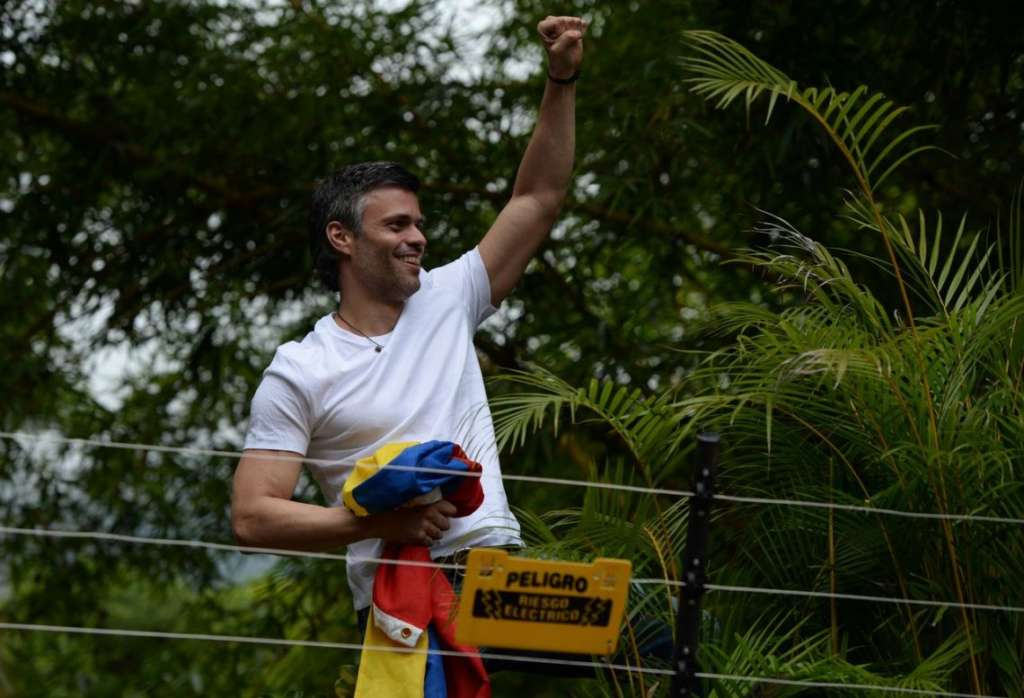Leopoldo Lopez, Venezuela’s most prominent political prisoner, was released from prison on Saturday, but promptly placed under house arrest.
Lopez, leader of the Voluntad Popular (Popular Will) party and a symbol of resistance to President Nicolas Maduro’s government, emerged hours after his release from prison looking fit and happy.
He pumped his fist in the air, unfurled the Venezuelan flag and told a crowd of supporters who had gathered outside: “Yes, we can!”
“I maintain my firm opposition to this regime,” Lopez said in a statement read by a leader of his party. “I reiterate my commitment to fight until conquering Venezuela’s freedom.”
“If maintaining my fight for freedom means running the risk of returning to a cell in Ramo Verde, I am more than happy to take it,” he said in the message read by Freddy Guevara, the No. 2 in Lopez’s Popular Will party.
“Today, I am a prisoner in my house, but so are the Venezuelan people. What kept me going in the toughest days was knowing that whatever suffering I endured was nothing compared to our people.”
“Despite being under house arrest, he showed his face to the country,” said Maria Garcia, 36, a business consultant, outside his house. “What we need to do now is stay in the street, because we need to achieve not just the freedom of Leopoldo but also the freedom of the Venezuelan people.”
Maduro, in televised remarks later Saturday, called for a message of “peace and rectification” from Lopez.
Maduro said he hoped the statement from Lopez could provide the basis for reconciliation “because the nation wants peace.”
Lopez was later placed under house arrest, a surprising move that comes amid intensifying pressure on the embattled Maduro, with a rising toll of death and destruction from three months of non-stop street protests.
Lopez, a 46-year-old Harvard-trained politician, was held for more than three and a half years in a military prison outside Caracas for allegedly “inciting violence” by calling for anti-government protests.
His release has been a key demand of Venezuela’s opposition and the international community, amid an intensifying political confrontation aimed at forcing the unpopular Maduro to hold early elections.
Attorney General Luisa Ortega — the most senior figure to defy Maduro — accused the government of using Lopez to “improve its image.”
“People deprived of liberty cannot be used as if they were hostages that can be objects of negotiation,” she told the Chilean daily newspaper La Tercera.
At least 91 people have died since April 1 in clashes between protesters and security forces over moves by the courts and the government to strip the National Assembly of power, delay elections and rewrite the constitution.
The Supreme Court said it had ordered Lopez’s move to house arrest for health reasons, calling it a “humanitarian measure.”
In Madrid, Javier Cremades, Lopez’s Spanish lawyer, underscored that “all of Leopoldo Lopez’s civil and political rights must still be restored.”
“What’s more, there are still 300 political prisoners in the Bolivarian jails,” he added.
Foro Penal, an NGO, puts the number of political prisoners in Venezuela at 433. The government insists they are in jail for acts of violence.
The US State Department called the release of Lopez “a significant step in the right direction” — but said many more such steps are needed.
On Friday night, Lopez’s wife Lilian Tintori spent an hour visiting her husband in his cell at Ramo Verde prison just outside Caracas.
The former mayor of a Caracas municipality, Lopez was an early champion of street protests to force political change in Venezuela as the oil-rich country spiraled into a severe economic and political crisis after the death of Maduro’s predecessor, Hugo Chavez.
The government blamed Lopez for a months-long outbreak of anti-government protests in 2014 that left 43 people dead in clashes with security forces.
He was sentenced to nearly 14 years in prison on charges that his defense said were politically motivated and based on “manipulated” evidence.
Since then the crisis has deepened, with more deaths and increasing levels of violence.
On Wednesday, pro-government militants wielding sticks and pipes stormed the grounds of the opposition-held National Assembly and beat lawmakers, injuring at least five at the only state institution that the opposition nominally controls.
Maduro condemned the violence and said he had ordered an investigation.
